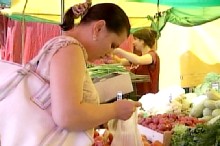Focus shifts to sprouts in E.coli outbreak
BERLIN – Official test results Monday are likely to show that sprouts from an organic farm in northern Germany caused the E. coli outbreak that has killed 22 people, sickened more than 2,200 and left Europeans across the continent uneasy about eating raw vegetables.
If sprouts from the farm in the village of Bienenbuettel, between Hamburg and Hannover, are confirmed as the only source of the highly aggressive, "super-toxic" strain of bacteria, it could solve a mystery that has puzzled authorities for weeks. Suspicion for the cause of the deadliest known E. coli outbreak had fallen on lettuce, tomatoes and cucumbers, initially from Spain.
Even so, authorities say the danger is not over yet. More cases of the illness, which has hit Germany hardest, are likely for at least another week because the contaminated sprouts may have already been delivered to restaurants and grocery stores across Germany and could infect consumers.
And health officials still say they cannot yet rule out that there may be other sources for the infection as well. They warned against eating any sprouts and kept up a general warning for tomatoes, cucumbers and lettuces.
"While we have strong and clear indications that a farm in Uelzen is involved (in the E.coli outbreak), we have to wait for the official lab results," German Health Minister Daniel Bahr said late Sunday. "Until then, we cannot give an all-clear." The village of Bienenbuettel is next to Uelzen.
Spanish farmers expressed relief that the source appeared to have been identified, but complained that early accusations against Spanish cucumbers were still having a devastating financial effect.
"This is one of the demands we have been making, that they say clearly where the problem with the bacteria was," said Andres Gongora, the leader of a major Spanish farm association, COAG. "So we feel more at ease, although at no time did we ever harbor any doubt."
Gongora added: "With the same intensity with which it accused us, Germany must now clarify beyond the shadow of a doubt that that problem was not here, that it was not with Spanish agricultural products."
As farmers demand they be compensated for their losses, the European Union on Tuesday will hold an emergency meeting of farm ministers in Luxembourg to address the crisis and its economic impact, including a ban by Russia on all vegetables from the EU. The ministers will "look at how the EU can respond to the economic impact of the crisis," EU spokesman Roger Waite said.
At a regular meeting of EU health minister in Luxembourg on Monday, Germany defended itself against claims it had acted prematurely in pointing toward Spanish cucumbers. "The virus is so aggressive that we had to check every track," said Health State Secretary Annette Widmann-Mauz. "We owe it to the people."
Germany's Federal Institute for Risk Assessment had warned about the consumption of vegetable sprouts as early as June 2010.
In the meantime, opposition lawmakers criticized the government's handling of the health crisis.
"There is no crisis management at all," said Renate Kuenast, a leading lawmaker with the Green Party. "I'm asking myself what at all the health minister and the minister for consumer affairs are doing," Kuenast told Monday's daily Berliner Zeitung.
Sprouts have been implicated in previous E. coli outbreaks, particularly one in 1996 in Japan, in which tainted radish sprouts killed 12 people and reportedly sickened more than 12,000.
Preliminary epidemiological tests found Sunday that bean sprouts and other sprout varieties from the farm Gaertnerhof Bienenbuettel could be traced to infections in five German states. Many restaurants had received deliveries of the sprouts, which are often used in mixed salads.
The farm in Bienenbuettel was shut down Sunday and all its produce recalled, including fresh herbs, fruits, flowers and potatoes. Two of its employees were also infected with E. coli, Lower Saxony Agriculture Minister Lindemann said Sunday. He said 18 different sprout mixtures from the farm were under suspicion, including sprouts of mung beans, broccoli, peas, chickpeas, garlic lentils and radishes.
Klaus Verbeck, who is in charge of sprouts at the farm, was quoted as saying he had no idea where the allegations were coming from.
Verbeck told the daily Neue Osnabruecker Zeitung on Sunday that he grows the sprouts only with water and does not use any kind of manure or fertilizer.
However, the agricultural minister said that Verbeck's sprouts grow with steam in barrels at 38 degrees Celsius (100 degrees Fahrenheit) which he called an ideal environment for bacteria to multiply.
He said it is possible that the water was contaminated with E. coli or that the sprout seeds — purchased in Germany and other countries — contained the germ. He said the farmers had not used any manure, which is commonly spread on organic farms and has been known to cause E. coli outbreaks.
Officials at the U.S. Centers for Disease Control and Prevention say two previous reports of a similar strain have occurred elsewhere. One involved a 29-year-old woman in South Korea, reported in 2006. The other was a small cluster of cases in the Republic of Georgia in 2009.
E. coli can be found in the feces of humans and livestock and can spread to produce through sloppy bathroom habits among farmworkers and through animal waste in fields and in irrigation water. Organic farms tend to use more manure than other producers do.
____
Raf Casert contributed from Brussels, Daniel Woolls from Madrid, Spain.
http://news.yahoo.com/s/ap/20110606/ap_on_he_me/eu_contaminated_vegetables_europe


Tidak ada komentar:
Posting Komentar